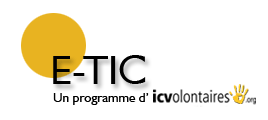AgriGuide in the process of being tested and improved30 May 2014 ICV is gearing up to prepare the next phase of the AgriGuide project, focusing on agricultural practices, as well as information provided to herders and fishermen. This project is part of the E-TIC program, which aims to empower local communities through the meaningful use of communication and the sharing of knowledge in a hands-on fashion. The program strives to improve the efficiency of specific industries and sectors in which ethics and the environment take a predominant role and the livelihood and well-being of individuals is of primary concern. The first version of the AgriGuide was assembled based on the request of farmers, herders and fishermen in Senegal and Mali. They pointed out that it would be useful to use less pesticides and synthetic fertilizer in agriculture, in order to preserve biodiversity, the richness of soils and the environment, but that it was difficult to move to organic farming practices without clear and sound instructions. The guide provides a list of common crops in the two countries and then looks at how these can best be planted, grown, harvested and stored. Furthermore, it touches on questions related to the dangers of pesticides when overused and sprayed without appropriate protection. Video testimonials show poignant examples of pesticide accidents and hazards, begging the question on ways to prevent them. All the relevant data and information was assembled by agronomists. In addition, illustrators designed images to better explain concepts of health hazards related to agricultural practices. Agro-Sans-Frontières is getting involved in the AgriGuide project. And in the last couple of weeks, students from the University of Applied Sciences of Western Switzerland, technology, architecture and landscape (hepia in Geneva), analyzed the content of the AgriGuide in order to propose concrete suggestions on how to improve it. “It’s useful for our students to look at the AgriGuide in depth,” pointed out Lucas Luisoni, lecturer at hepia. During the presentation of their analysis, during the course “Development Cooperation and International Horticulture”, students in agronomy, pointed out the critical role the guide played in understanding a tangible application of their agricultural studies into the ‘real-world’. The following fiches were among those analyzed: tomatoes, carrots, lettuce, water melon, cabbage and onions. Brainstorming to generate ideas brought forward suggestions on how to best improve each fiche and add value to the second version of the guide. AgriWiki, a dynamic and easily updatable version of the guide, is being set up to serve as a repertoire of agricultural practices focusing on organic farming. The seamless timing of ICV’s invitation to attend the Forum International Francophone - jeunesse et emplois verts (International Francophone Forum- Youth and Green Jobs) adds excitement to this dynamic project. The Forum will be taking place in Niamey, Niger, from 10-12 June 2014. Two ICV representatives will be taking part in this great opportunity to meet people, especially young adults who are passionate about sustainability. Nazir Sunderji, Senior Adviser of ICV and one of the two participants, points out that without responsible environmental stewardship, economic development is at risk. For Namory Diakhaté, ICV’s Representative in Dakar, this Forum will be a good opportunity to meet young people who might wish to take an active part in the dynamics of the AgriGuide project. To add to the anticipation, a competition for designers, photographers and agricultural experts are in the works for this event. For more information about the AgriGuide project, see http://www.agriguide.org and http://www.agriwiki.org. Posted: 2014-5-30 Updated: 2014-6-01 |


